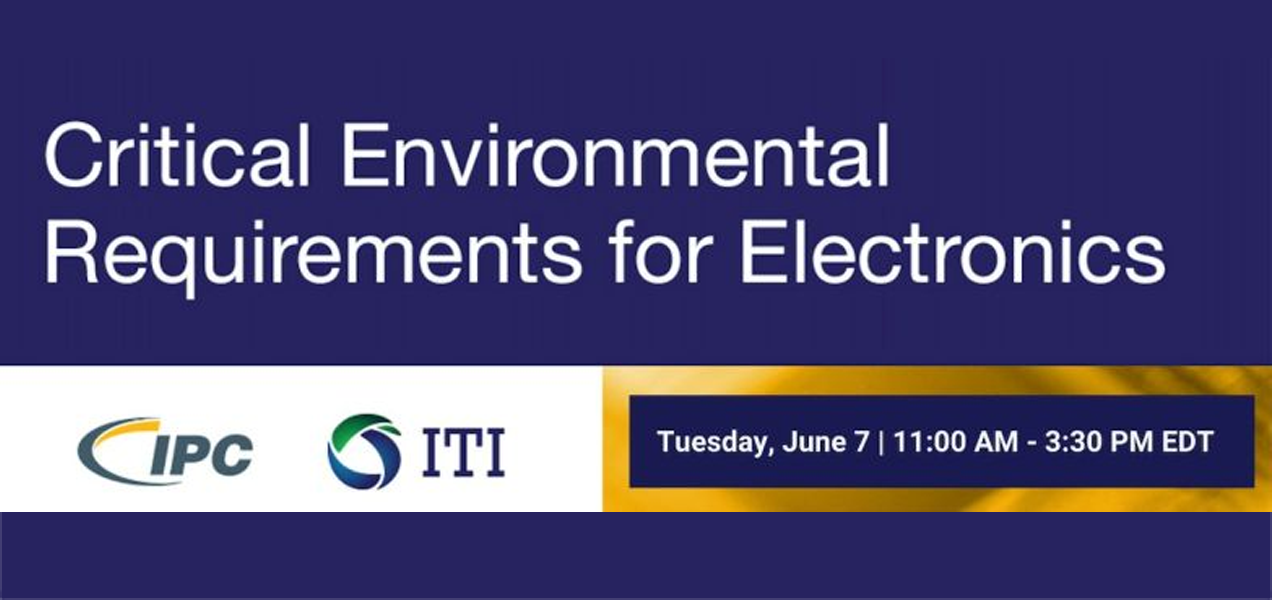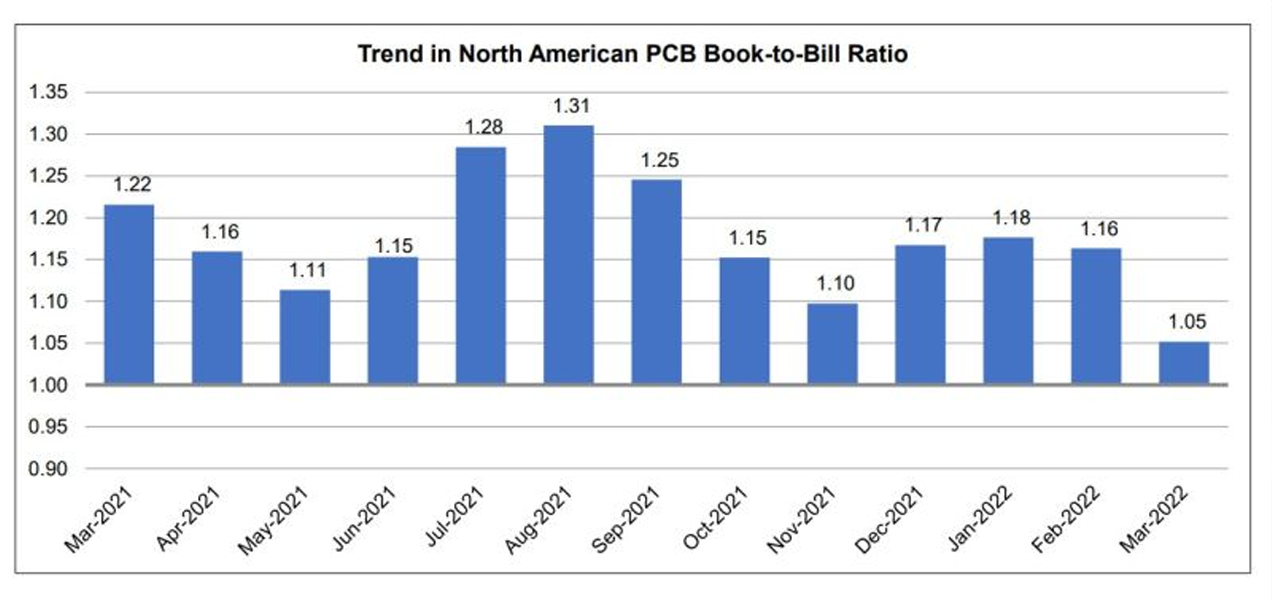 |
Dear IPC Members:
I hope this newsletter finds you and yours doing well.
In our top news this week, IPC's Thought Leaders Program released a new report outlining how the United States can remedy years of neglect and double its manufacturing capacity for printed circuit boards (PCBs) and integrated circuit (IC) substrates in just five years. |
Meanwhile, discussions on a proposal that seeks to strengthen reporting requirements for sustainability information of certain large companies kicked up a notch in Europe, with a final agreement expected by June.
In other news, environmental regulators are remaining busy on several fronts in the United States, Europe, and Asia.
All of these topics and more are covered below. Please let us know if you have any questions or suggestions for IPC advocacy. We are here to support you.
All the best,
Chris Mitchell
Vice President, Global Government Relations
The Headlines at a Glance:
TOP NEWS OF THE WEEK
- IPC Report Outlines Critical Investments Needed in U.S. PCB Manufacturing
- How Are PFAS Policies Affecting the Electronics Industry?
QUOTE OF THE WEEK
- Mike Carano Comments on How to Improve U.S. Manufacturing Capacity
IPC ADVOCACY AND YOU
- Tell Congress: A Robust U.S. Electronics Industry is in the National Interest!
ENVIRONMENT AND HEALTH
- IPC Responds to REACH Regulation Revision
- Lead Included on Draft List for REACH Authorization
- Consultation Opens on the General Review of the RoHS Directive
- EPA Reopens Comment Period on 20 Toxic Substances
- Commission Opens Consultation on a New Regulation for Sustainable Products
EUROPEAN UNION
- EU Institutions Near Agreement on CSRD
HELP US SPREAD THE WORD ON SOCIAL MEDIA
KEEP IN TOUCH WITH US
TOP NEWS OF THE WEEK
IPC Report Outlines Critical Investments Needed in U.S. PCB Manufacturing: If the federal government and semiconductor manufacturers are serious about boosting chip fabrication in the United States, they will need to make significant investments in small- and medium-sized printed circuit board (PCB) manufacturers. A new report released this week from IPC Thought Leaders Program Chair Mike Carano identifies the best opportunities and the specific investments needed to position U.S. PCB manufacturing for the future. IPC Contact: Chris Mitchell.
How Are PFAS Policies Affecting the Electronics Industry? On April 21, Kelly Scanlon, IPC’s director of EHS policy and research, led a free webinar on how per- and polyfluoroalkyl substances (PFAS) are used in electronics manufacturing and how future regulations of PFAS might affect the industry. You can view the slide deck here. Please let us know if you have any questions on what your company can do to address PFAS policy activities. IPC Contact: Kelly Scanlon.
QUOTE OF THE WEEK
 |
“The heart of the electronic system is the printed circuit board. Without the printed circuit board, there is nowhere for semiconductor chips and other components to go.”
– Mike Carano, Chairman of the IPC Thought Leaders Program, comments on need for the United States to double its manufacturing capacity for PCBs and integrated circuit (IC) substrates in a new IPC report.
|
IPC ADVOCACY AND YOU
Tell Congress: A Robust U.S. Electronics Industry is in the National Interest: Encouraging the U.S. government to take a holistic approach to rebuilding its domestic electronics manufacturing ecosystem is the central theme of IPC’s IMPACT Washington Advocacy Campaign. If you agree, please visit the IPC Online Advocacy Center now to tell your Members of Congress to help secure federal support for the entire electronics supply chain. It only takes a minute and has a real impact! IPC Contact: Ken Schramko.
ENVIRONMENT & HEALTH
IPC Responds to REACH Regulation Revision: IPC, alongside a European technology industry partnership, recently responded to the European Commission’s public consultation on the revision of the Registration, Evaluation, Authorization and Restriction of Chemicals (REACH) Regulation. The response provided feedback on information requirements on chemical use and exposure; methods for simplifying communications within supply chains; the utility of applying the “essential use” concept; and more. An official legislative proposal is expected by the end of 2022. Let us know if you would like to learn more about the partnership’s response or IPC’s involvement. IPC Contact: Kelly Scanlon.
Lead Included on Draft List for REACH Authorization: Lead (Pb) metal is one of eight substances included in a draft list of substances being considered for inclusion on the Authorization List (Annex XIV) of the Registration, Evaluation, Authorization and Restriction of Chemicals (REACH) Regulation. IPC prepared a draft response to the public consultation to provide industry insights on the potential socio-economic effects of an authorization. The consultation closes May 2. Please let us know if you would like to learn more about IPC’s position on this policy activity. IPC Contact: Kelly Scanlon.
Consultation Opens on General Review of RoHS Directive: The European Commission has opened a public consultation on the general review of the Restriction of Hazardous Substances (RoHS) Directive, including evaluation of the criteria and timelines for exemptions. The RoHS Directive, which aims to protect human health and the environment and maximize recovery of certain hazardous substances after their use, is one of the most important policies shaping electronics manufacturing. The deadline for comment is June 2. IPC will coordinate a response to this questionnaire, and we invite your engagement with us. IPC Contact: Kelly Scanlon.
EPA Reopens Comment Period on 20 Toxic Substances: The U.S. Environmental Protection Agency (EPA) has reopened the dockets for the 20 high-priority substances to undergo risk evaluation under the Toxic Substances Control Act (TSCA). This provides an additional opportunity for the electronics manufacturing industry to submit information that would help inform the risk evaluation processes for these chemicals, some of which have relevance to electronics manufacturing processes and products. The dockets are open until June 9. Please let us know if you are interested in this opportunity to inform future policy decisions. IPC Contact: Kelly Scanlon.
Commission Opens Consultation on New Regulation for Sustainable Products: The European Commission has opened a public consultation on a regulation that would repeal the existing Ecodesign Directive and establish a new framework for setting ecodesign requirements for sustainable products. The proposed regulation notably includes requirements for identifying substances of concern across a product life cycle and information requirements, including a digital product passport. The consultation is open through June 15. IPC welcomes your feedback on the proposed regulation. IPC Contact: Kelly Scanlon.
EUROPEAN UNION
EU Institutions Near Agreement on CSRD: Following the second round of negotiations this week, the EU institutions are expected to reach an agreement on the proposal for the Corporate Sustainability Reporting Directive (CSRD) by June. The EU institutions also agreed to allow companies an additional year to comply with the new rules, with the first reports due in 2025. However, a key issue yet to be resolved includes whether small and medium-sized enterprises (SMEs) should be compelled to report to the future standards. Once the CSRD is approved, the European Commission also expects to adopt new EU sustainability standards, which will complement the CSRD by defining technical details that companies should report on. IPC Contact: Alison James.
HELP US SPREAD THE WORD ON SOCIAL MEDIA
 |
|
 |
Want to stay ahead of global issues and environmental policy trends that are impacting electronics manufacturers? Want to expand your network and connect with peers, customers, and suppliers in the electronics manufacturing industry? Join IPC and Information Technology Industry Council (ITI) for the virtual 2022 Critical Environmental Requirements for Electronics Conference on June 7. |
North American printed circuit board (PCB) industry sales were down 11.7% in March, hinting at a “slowing demand across a number of downstream sectors,” according to Shawn DuBravac, IPC chief economist. |
KEEP IN TOUCH WITH US
Meet the IPC GR Team: Whether it’s engaging with policymakers in Washington, D.C., in the European Union or in China, the IPC Government Relations (GR) Team proactively seeks opportunities to educate, inform and influence policymakers on policies that spur innovation, growth and competition, while protecting human health and the environment. But our success depends on your support and engagement. Learn more and get involved in IPC advocacy today! IPC Contact: Chris Mitchell.
Subscribe to IPC Global Advocacy Report: If you’re a member of IPC, manage your e-mail preferences and opt in to receive “Advocacy” updates. If you are not an IPC member — or you’re not sure — please send a note to friends@ipc.org, and our staff will add you to the list.
Follow us on Twitter and LinkedIn.
Contact one of us if you have any questions or insights to contribute.
Tell us how government policies affect your business.
See prior editions of Global Advocacy Report.
Explore our IPC Government Relations information online.
|
